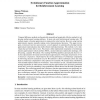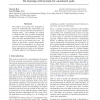269 search results - page 15 / 54 » A Minimax Method for Learning Functional Networks |
CORR
2010
Springer
13 years 7 months ago
2010
Springer
Temporal difference methods are theoretically grounded and empirically effective methods for addressing reinforcement learning problems. In most real-world reinforcement learning ...
BMCBI
2006
13 years 7 months ago
2006
Background: The modeling of dynamic systems requires estimating kinetic parameters from experimentally measured time-courses. Conventional global optimization methods used for par...
ICML
2010
IEEE
13 years 8 months ago
2010
IEEE
We propose and analyze two strategies to learn over unordered pairs with kernels, and provide a common theoretical framework to compare them. The strategies are related to methods...
ICML
2009
IEEE
14 years 8 months ago
2009
IEEE
This paper addresses exact learning of Bayesian network structure from data and expert's knowledge based on score functions that are decomposable. First, it describes useful ...
ML
1998
ACM
13 years 7 months ago
1998
ACM
Following Tesauro’s work on TD-Gammon, we used a 4000 parameter feed-forward neural network to develop a competitive backgammon evaluation function. Play proceeds by a roll of t...



